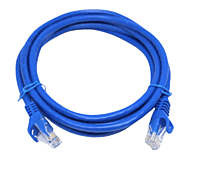



LAN/Ethernet Cable
The LAN Cable, also known as an Ethernet cable, is a reliable solution for network connectivity. With various categories like Cat5e or Cat6, these cables facilitate high-speed data transmission, ensuring stable and robust connections for home or office networks
Non-returnable
Out of stock
Rs.60.00
Share:
Product Details
Common LAN Cable Categories:
Cat5e (Category 5e): Cat5e cables are designed for basic network connectivity and support data rates of up to 1 Gbps (gigabit per second) over short distances. They are suitable for home and small office networks.
Cat6 (Category 6): Cat6 cables offer improved performance compared to Cat5e, supporting higher data rates of up to 10 Gbps over shorter distances. They are commonly used in both residential and commercial environments.
Cat6a (Category 6a): Cat6a cables provide enhanced performance and can support data rates of up to 10 Gbps over longer distances compared to Cat6. They are often used in applications where higher bandwidth is required, such as data centers and larger networks.
Cat7 (Category 7): Cat7 cables are designed to support even higher data rates and better noise reduction. They can support data rates of up to 10 Gbps or more over longer distances. Cat7 cables are used in demanding environments where maximum performance and minimal interference are crucial.
Key Features:
Twisted Pair Construction: LAN cables use twisted pairs of copper wires to reduce electromagnetic interference and improve signal quality.
RJ45 Connectors: LAN cables typically have RJ45 connectors on both ends. These connectors are used to plug the cable into network devices such as computers, switches, routers, and modems.
Color Coding: Ethernet cables often have color-coded connectors or labels to help identify their category or functionality.
Solid vs. Stranded: LAN cables come in two main types: solid and stranded. Solid cables are used for fixed installations, while stranded cables are more flexible and suitable for applications where cables may be moved frequently.
Uses:
Wired Networking: LAN cables are used to establish wired network connections between computers, printers, routers, switches, and other networked devices.
Internet Connectivity: LAN cables are commonly used to provide high-speed internet connectivity through modems and routers.
Data Sharing: LAN cables facilitate data sharing, file transfers, and communication within a local network environment.
Gaming: LAN cables are often used by gamers to ensure low-latency connections for online gaming.
When choosing a LAN cable, consider the category and length you need based on your network requirements. For maximum performance, ensure that your cable quality matches your network's speed requirements.


